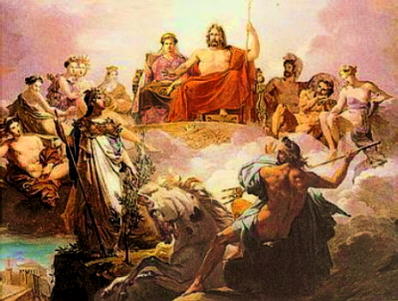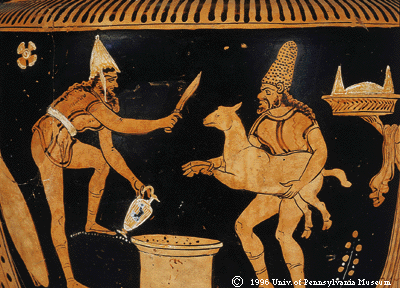Greece, from the ancient to the modern period, has held onto its tradition of evolving in history as a very religious country. They have numerous gods and goddesses who are worshipped dedicatedly and regularly. The influence of these gods and goddesses is not only limited to the day-to-day livelihood of the Greek population but has cast a significant influence on the royal dispensation as well. Most of the planets in our solar system are named after Greek gods and goddesses. Ancient Greek religion was based on faith and belief. And, each of them had a god or goddess associated with it.
As mentioned earlier, Greeks had gods and goddesses for more or less every event, occupation, nature, or emotion. That is how there were gods of love, war, sea, farming, and so on and so forth. The relationship between the Ancient Greeks and their gods was rather complicated. Their relationship was personal, geographical, or common general terms. In a personal relationship with a god or goddess, a person interacted directly with the god or goddess. Gods and goddesses were also worshipped for the benefit of natural forces in their favor and to suit their needs. In a geographical relationship, a god favored a city or state over another city or state. The Ancient Greeks believed that the gods were physically and intellectually similar to the mortals. The ancient Greek gods were presumed to have emotions and that is why Greek mythology is filled with tales of revenge, greed, jealousy, and wars among gods.

The Religion of the Ancient Greek People
As mentioned earlier, religion had an all-pervasive hold over the lives of the Ancient Greeks. It was direct, personal, and present in all aspects of livelihood. There were sacrifices made, such as human sacrifices, libations, etc. to please the gods and goddesses and there were myths to explain the origins of humankind. Ancient Greek religion was deeply soaked in mythology. Gods were worshipped in temples, which dominated in the urban circles, were given a human face and there were city festivals and national sporting and artistic competitions. In all these aspects, religion remained a key determinant of the Ancient Greeks. There was of course individual space regarding the level and extent of the belief system as the gods were concerned because there the existence of certain groups of people who were completely skeptical about the existence of gods. But for the smooth functioning of the Greek society and government, certain fundamentals were followed: the existence of gods was believed, their influence on human affairs was recognized and the Greeks respected and responded to acts of worship and piety.

Some Important Ancient Greek Gods and Goddesses
Ancient Greek religion was never monotheistic and always constituted a polytheistic approach towards religion. It encompassed a myriad of gods, each representing a certain facet of the human condition, and even ideas such as wisdom and justice could also take god forms. There were of course certain groups of gods, the most important being the Olympian gods, among whom Zeus was the most important god of Ancient Greece. Olympian gods contained the name of 12 gods who were believed to have stayed in and around Mt. Olympus and were in all probability, recognized across Greece with certain local and regional variations which could have been due to attributes and associations. Gods were given human characters and were personified both as good and bad, According to Greek mythology, they married, had children (often by illicit means), fought battles, and sometimes directly intervened in human affairs. Most of these beliefs were through oral recitations, as there was no holy book of the Ancient Greeks and were depicted in the later works of Homer and Hesiod. The 13 Olympian gods may be listed as:
1. Zeus- King of Gods and god of the sky.
2. Athena- Goddess associated with wisdom, warfare, and handicraft.
3. Apollo- God of archery, music and dance, truth and prophecy, healing and diseases, poetry, and the sun and light.
4. Poseidon- God of sea, water, earthquakes, and horses.
5. Hermes- God of trade, wealth, fertility, luck, thieves, travel, language, and sleep.
6. Hera- Goddess of marriage, family, and women and is the protector of women during childbirth.
7. Aphrodite- Goddess of sexual love and beauty.
8. Demeter- Goddess of harvest.
9. Ares- God of war or the spirit of battle.
10. Artemis- Goddess of wild animals, hunting, vegetation, and of chastity of childbirth.
11. Hades- God of the underworld.
12. Hephaistos- God of fire.
13. Dionysus- God of wine and ecstasy.
Zeus: The King of Gods
Zeus was the King of Gods and the gods fought and planned for dominance either under Zeus or against him. The Ancient Greeks believed that the gods decide their fate and so it was futile to have free will or to try and outwit the gods. This would explain the sacrifices and gifts the people of Ancient Greece that they would offer to gods if they sought some form of assistance from them. For instance, a sea voyage was never undertaken before making an offering to Poseidon, god of sea and ocean. But the position of Zeus, as per Greek mythology, was supreme.
The Ancient Greek Religious Culture
In Ancient Greece, there was no issue of converting people to one religion. All people of one culture had the same religion and the religion was defined by their experience with gods or deities. Such was their thought process. Other religions were barbarous to them. An overview of their religions can be seen in their artworks and philosophies.
Different cities adopted different gods as their patrons. For example, Aphrodite was the patron of Corinth while Helios was of Rhodes. Gods were evoked for specific ceremonies such as marriages and wars. Outside gods were also worshipped and included within the Greek pantheon. The temple was considered the abode of the gods and the place where they stayed on special occasions. Here, religion was very formal and priests carried out ceremonies in the Ancient Greek temples. Famous and massive temples have been found in Ancient Greek cities with huge statues of the gods and goddesses. The sacred area of the temple was separated from the rest of the temple by a “propylon” (symbolic gate). They had permanent caretakers and received huge amounts of donations from the devotees, particularly when their prayers were answered. Animal sacrifice was made along with libation. Pigs, sheep, cows, and goats were mostly sacrificed and the meat was either completely burnt or partly cooked as offerings. Priests had to wear a sacred headband while performing religious ceremonies. Women priests were also found. These women were either virgins or beyond menopause.

Ancient Greek Rituals
The practice of Ancient Greek religion involves both private and public aspects. Within the home, a religion focused on the hearth and the goddess Hestia. The maintenance of the home fire was an important ritual that served as a focus for worship. Other rituals involved prayers, meals, and storytelling. They also resorted to spiritual methods to find peace.
Apart from traditional religious practices, mysteries and oracles were also in practice in Ancient Greece. The Mysteries of Eleusis consisted of closed groups where the members believed in certain activities which gave spiritual benefits and a better afterlife. The oracles of Apollo at Delphi and Zeus at Dodona were the places where the priests conducted rituals and received the message of the oracles. Athletic games and music competitions were held in cities like Athens, Nemea, Isthmia, and Olympia in honor of the gods. Visitors from all over Greece reached these centers as pilgrims and attended these small festivities.
Lastly, much of Christianity was simply the adoption of the Greek religion with the names changed. As ancient Greece started interacting with other cultures through wars, religion started evolving. Religion in ancient Greece was impacted by Islam, Christianity and early Roman belief system which is evident even today in Greece.